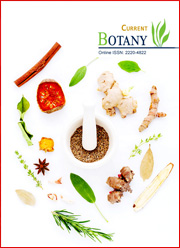Potential of Trichoderma Species as Biocontrol Agents of Soil Borne Fungal Propagules
Abstract
Six isolates of Trichoderma spp. were tested for their ability to inhibit soil borne pathogens of different vegetables viz., Rhizoctonia solani (isolates from tomato), Sclerotium rolfsii (causing collar rot of tomato) and Sclerotinia sclerotiorum (causing web blight of beans) under in vitro conditions. Dual culture of pathogens and Trichoderma spp. revealed T. viride (Tv-2) highly inhibited the mycelial growth (71.41 per cent over control) in case of Rhizoctonia solani followed by T. viride (Tv-1) and T. harzianum (Th-1) showing 65.71 and 60.51 per cent inhibition over control, respectively. Similarly in case of Sclerotium rolfsii and Sclerotinia sclerotiorum, T. viride (Tv-1) proved to be best over all isolates in inhibiting mycelial growth of test pathogens (67.91 and 66.21 per cent inhibition over control, respectively). Further, all Trichoderma isolates significantly inhibited the production of sclerotia in test pathogens. T. viride (Tv-1) was most effective in reducing sclerotial production (83.75 per cent in R. solani, 80.18 per cent in S. rolfsii and 70.15 per cent in S. sclerotiorum).
Key words: Antagonism, Soil borne pathogens, Trichoderma, Biocontrol
Faheem Amin et al. Potential of Trichoderma Species as Biocontrol Agents of Soil Borne Fungal Propagules. J Phytol 2/10 (2010) 38-41







 .
.